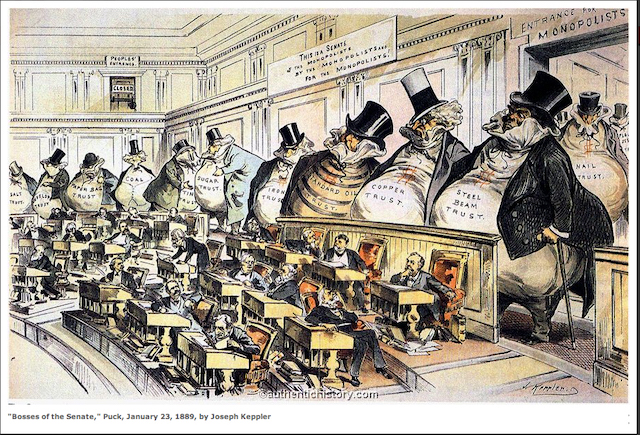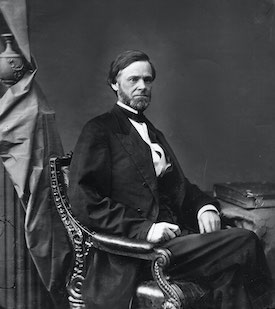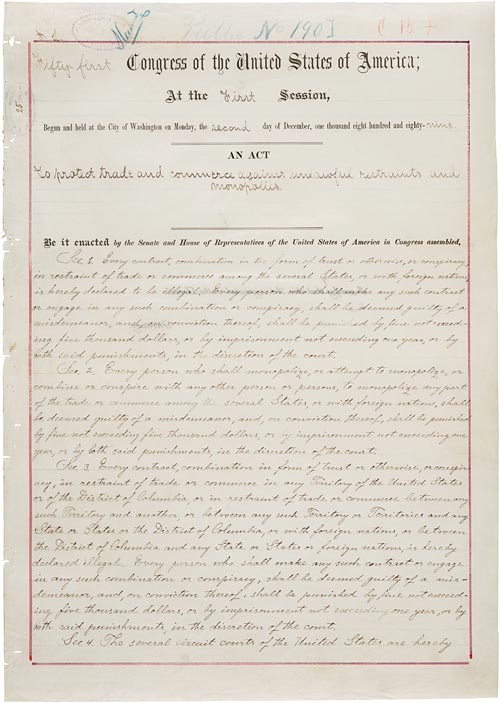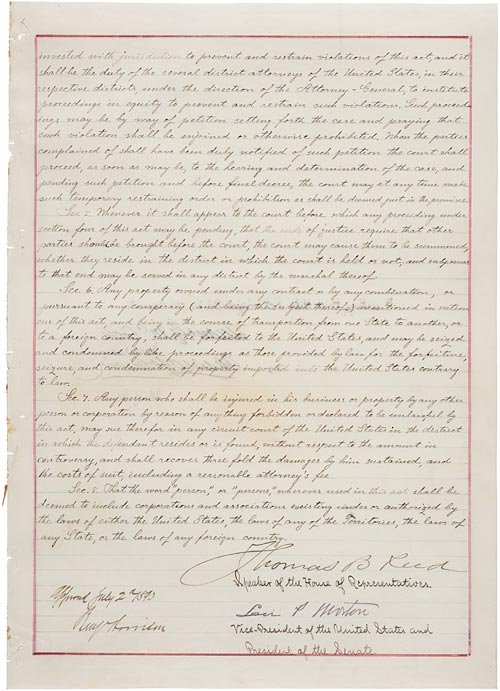 ~ Prologue ~
~ Prologue ~
The Sherman Antitrust Act of 1890 was the first measure passed by the U.S. Congress to prohibit trusts. It was named for Senator John Sherman of Ohio, who was a chairman of the Senate finance committee and the Secretary of the Treasury under President Hayes. Several states had passed similar laws, but they were limited to intrastate businesses. The Sherman Antitrust Act was based on the constitutional power of Congress to regulate interstate commerce. (For more background, see previous milestone documents: The Constitution of the united States, Gibbons v. Ogden, and the Interstate Commerce Act.) The Sherman Anti-Trust Act passed the Senate by a vote of 51–1 on April 8, 1890, and the House by a unanimous vote of 242–0 on June 20, 1890. President Benjamin Harrison signed the bill into law on July 2, 1890.
A trust was an arrangement by which stockholders in several companies transferred their shares to a single set of trustees. In exchange, the stockholders received a certificate entitling them to a specified share of the consolidated earnings of the jointly managed companies. The trusts came to dominate a number of major industries, destroying competition. For example, on January 2, 1882, the Standard Oil Trust was formed. Attorney Samuel Dodd of Standard Oil first had the idea of a trust. A board of trustees was set up, and all the Standard properties were placed in its hands. Every stockholder received 20 trust certificates for each share of Standard Oil stock. All the profits of the component companies were sent to the nine trustees, who determined the dividends. The nine trustees elected the directors and officers of all the component companies. This allowed the Standard Oil to function as a monopoly since the nine trustees ran all the component companies.
The Sherman Act authorized the Federal Government to institute proceedings against trusts in order to dissolve them. Any combination “in the form of trust or otherwise that was in restraint of trade or commerce among the several states, or with foreign nations” was declared illegal. Persons forming such combinations were subject to fines of $5,000 and a year in jail. Individuals and companies suffering losses because of trusts were permitted to sue in Federal court for triple damages. The Sherman Act was designed to restore competition but was loosely worded and failed to define such critical terms as “trust,” “combination,” “conspiracy,” and “monopoly.” Five years later, the Supreme Court dismantled the Sherman Act in United States v. E. C. Knight Company (1895). The Court ruled that the American Sugar Refining Company, one of the other defendants in the case, had not violated the law even though the company controlled about 98 percent of all sugar refining in the United States. The Court opinion reasoned that the company’s control of manufacture did not constitute a control of trade.
The Court’s ruling in E. C. Knight seemed to end any government regulation of trusts. In spite of this, during President Theodore Roosevelt’s “trust busting” campaigns at the turn of the century, the Sherman Act was used with considerable success. In 1904 the Court upheld the government’s suit to dissolve the Northern Securities Company in State of Minnesota v. Northern Securities Company. By 1911, President Taft had used the act against the Standard Oil Company and the American Tobacco Company. In the late 1990s, in another effort to ensure a competitive free market system, the Federal Government used the Sherman Act, then over 100 years old, against the giant Microsoft computer software company.
~ Expanded ~
The Sherman Antitrust Act (Sherman Act, July 2, 1890, ch. 647, 26 Stat. 209, 15 U.S.C. 1–7) was the first United States Federal statute to limit cartels and monopolies. It falls under antitrust law.
The act provides: “Every contract, combination in the form of trust or otherwise, or conspiracy, in restraint of trade or commerce among the several States, or with foreign nations, is declared to be illegal.” The act also provides: “Every person who shall monopolize, or attempt to monopolize, or combine or conspire with any other person or persons, to monopolize any part of the trade or commerce among the several States, or with foreign nations, shall be deemed guilty of a felony.” The act put responsibility upon government attorneys and district courts to pursue and investigate trusts, companies and organizations suspected of violating the act. The Clayton Act (1914) extended the right to sue under the antitrust laws to “any person who shall be injured in his business or property by reason of anything forbidden in the antitrust laws.” Under the Clayton Act, private parties may sue in U.S. district court and should they prevail, they may be awarded treble damages and the cost of suit, including reasonable attorney’s fees.
 John Sherman (1823-1900) was the younger brother of the American Civil War general William Tecumseh Sherman. He became a U.S. senator from Ohio and served as a chairman of the Senate finance committee. He also served as a member of the U.S. Cabinet, including Secretary of State under President William McKinley and Secretary of the Treasury under President Hayes. Sherman was an expert on the regulation of commerce and was the chief author of the Sherman Antitrust Act.
John Sherman (1823-1900) was the younger brother of the American Civil War general William Tecumseh Sherman. He became a U.S. senator from Ohio and served as a chairman of the Senate finance committee. He also served as a member of the U.S. Cabinet, including Secretary of State under President William McKinley and Secretary of the Treasury under President Hayes. Sherman was an expert on the regulation of commerce and was the chief author of the Sherman Antitrust Act.
This ground-breaking piece of legislation was the result of intense public opposition to the concentration of economic power in large corporations and in combinations of business concerns (i,e., trusts) that had been taking place in the U.S. in the decades following the Civil War. Opposition to the trusts was particularly strong among farmers, who protested the high charges for transporting their products to the cities by railroad.
The Sherman Antitrust Act was the first measure enacted by the U.S. Congress to prohibit trusts (or monopolies of any type). Although several states had previously enacted similar laws, they were limited to intrastate commerce. The Sherman Antitrust Act, in contrast, was based on the constitutional power of Congress to regulate interstate commerce. It was passed by an overwhelming vote of 51 to 1 in the Senate and a unanimous vote of 242 to 0 in the House, and it was signed into law by President Benjamin Harrison.
The first part of Section 8 of the U.S. Constitution (with the interstate commerce clause underlined) states:
The Congress shall have Power To lay and collect Taxes, Duties, Imposts and Excises, to pay the Debts and provide for the common Defence and general Welfare of the United States; but all Duties, Imposts and Excises shall be uniform throughout the United States;
* To borrow Money on the credit of the United States;
* To regulate Commerce with foreign Nations, and among the several States, and with the Indian Tribes;
* To establish an uniform Rule of Naturalization, and uniform Laws on the subject of Bankruptcies throughout the United States;
* To coin Money, regulate the Value thereof, and of foreign Coin, and fix the Standard of Weights and Measures; …
The Sherman Antitrust Act (see below) authorized the Federal Government to dissolve the trusts. It began with the statement: “Every contract, combination in the form of trust or otherwise, or conspiracy, in restraint of trade or commerce among the several States, or with foreign nations, is declared to be illegal.” And it established penalties for persons convicted of establishing such combinations: “shall be punished by fine not exceeding $10,000,000 if a corporation, or, if any other person, $350,000, or by imprisonment not exceeding three years, or by both said punishments, in the discretion of the court.”
The Sherman Antitrust Act (1890)
Section 1. Trusts, etc., in restraint of trade illegal; penalty
Every contract, combination in the form of trust or otherwise, or conspiracy, in restraint of trade or commerce among the several States, or with foreign nations, is declared to be illegal. Every person who shall make any contract or engage in any combination or conspiracy hereby declared to be illegal shall be deemed guilty of a felony, and, on conviction thereof, shall be punished by fine not exceeding $10,000,000 if a corporation, or, if any other person, $350,000, or by imprisonment not exceeding three years, or by both said punishments, in the discretion of the court.
Section 2. Monopolizing trade a felony; penalty
Every person who shall monopolize, or attempt to monopolize, or combine or conspire with any other person or persons, to monopolize any part of the trade or commerce among the several States, or with foreign nations, shall be deemed guilty of a felony, and, on conviction thereof, shall be punished by fine not exceeding $10,000,000 if a corporation, or, if any other person, $350,000, or by imprisonment not exceeding three years, or by both said punishments, in the discretion of the court.
Section 3. Trusts in Territories or District of Columbia illegal; combination a felony
Every contract, combination in form of trust or otherwise, or conspiracy, in restraint of trade or commerce in any Territory of the United States or of the District of Columbia, or in restraint of trade or commerce between any such Territory and another, or between any such Territory or Territories and any State or States or the District of Columbia, or with foreign nations, or between the District of Columbia and any State or States or foreign nations, is declared illegal. Every person who shall make any such contract or engage in any such combination or conspiracy, shall be deemed guilty of a felony, and, on conviction thereof, shall be punished by fine not exceeding $10,000,000 if a corporation, or, if any other person, $350,000, or by imprisonment not exceeding three years, or both said punishments, in the discretion of the court.
Section 4. Jurisdiction of courts; duty of United States attorneys; procedure
The several district courts of the United States are invested with jurisdiction to prevent and restrain violations of sections 1 to 7 of this title; and it shall be the duty of the several United States attorneys, in their respective districts, under the direction of the Attorney General, to institute proceedings in equity to prevent and restrain such violations. Such proceedings may be by way of petition setting forth the case and praying that such violation shall be enjoined or otherwise prohibited. When the parties complained of shall have been duly notified of such petition the court shall proceed, as soon as may be, to the hearing and determination of the case; and pending such petition and before final decree, the court may at any time make such temporary restraining order or prohibition as shall be deemed just in the premises.
Section 5. Bringing in additional parties
Whenever it shall appear to the court before which any proceeding under section 4 of this title may be pending, that the ends of justice require that other parties should be brought before the court, the court may cause them to be summoned, whether they reside in the district in which the court is held or not; and subpoenas to that end may be served in any district by the marshal thereof.
Section 6. Forfeiture of property in transit
Any property owned under any contract or by any combination, or pursuant to any conspiracy (and being the subject thereof) mentioned in section 1 of this title, and being in the course of transportation from one State to another, or to a foreign country, shall be forfeited to the United States, and may be seized and condemned by like proceedings as those provided by law for the forfeiture, seizure, and condemnation of property imported into the United States contrary to law.
Section 6a. Conduct involving trade or commerce with foreign nations
Sections 1 to 7 of this title shall not apply to conduct involving trade or commerce (other than import trade or import commerce) with foreign nations unless –
(1) such conduct has a direct, substantial, and reasonably foreseeable effect –
(A) on trade or commerce which is not trade or commerce with foreign nations, or on import trade or import commerce with foreign nations; or
(B) on export trade or export commerce with foreign nations, of a person engaged in such trade or commerce in the United States; and
(2) such effect gives rise to a claim under the provisions of sections 1 to 7 of this title, other than this section.
If sections 1 to 7 of this title apply to such conduct only because of the operation of paragraph (1)(B), then sections 1 to 7 of this title shall apply to such conduct only for injury to export business in the United States.
Section 7. “Person” or “persons” defined
The word “person”, or “persons”, wherever used in sections 1 to 7 of this title shall be deemed to include corporations and associations existing under or authorized by the laws of either the United States, the laws of any of the Territories, the laws of any State, or the laws of any foreign country.

The Sherman Antitrust Act of 1890 was the first Act passed by the U.S. Congress to prohibit trusts.
It passed the Senate by a vote of 51-1 on April 8, 1890 and then passed the house by a unanimous vote of 242-0 on June 20, 1890. The bill was signed into law on July 2, 1890 by then President Benjamin Harrison.
The Sherman Act authorized the Federal Government to dissolve trusts but failed to define the critical terms in the law. In spite of that, the law achieved some success against some famous trusts such as Standard Oil Company, American Tobacco Company, and 100 years later, Microsoft. ~ Ed.
~ Postlogue ~
For more than a decade after its passage, the Sherman Antitrust Act was invoked only rarely against industrial monopolies, and then not successfully. Ironically, its only effective use for a number of years was against labor unions, which were held by the courts to be illegal combinations.
This was the result of intense political pressure from the trusts together with the loose wording of the act. Its critics pointed out that it failed to define such key terms as “combination,” “conspiracy,” “monopoly” and “trust.” Also working against it were narrow judicial interpretations as to what constituted trade or commerce among states.
Five years after its passage, the Supreme Court in effect dismantled the Sherman Antitrust Act in United States v. E. C. Knight Company, 156 U.S. 1 (1895). The court ruled that the American Sugar Refining Company, one of the other defendants in the case, had not violated the Act despite the fact that it controlled approximately 98 percent of all sugar refining in the U.S. The court’s explanation was that the company’s control of manufacturing did not constitute control of trade.
President William McKinley launched the trust-busting era in 1898 when he appointed several senators to the U.S. Industrial Commission. The commission’s subsequent report to President Theodore Roosevelt then laid the groundwork for Roosevelt’s attacks on trusts and finally resulted in the successful employment of the Act.
In a seminal 1904 decision, the Supreme Court upheld the Federal Government’s suit under the Sherman Antitrust Act to dissolve the Northern Securities Company (a railroad holding company) in State of Minnesota v. Northern Securities Company, 123 F. 692 (1903). Then, in 1911, after years of litigation, the court found Standard Oil Company of New Jersey in violation of the Sherman Antitrust Act because of its excessive restrictions on trade, particularly its practices of eliminating competitors by buying them out directly and by driving them out of business by temporarily slashing prices in a given region.
In this historic decision, the Supreme Court established an important legal standard termed the rule of reason. It stated that large size and monopoly in themselves are not necessarily bad and do not violate the Sherman Antitrust Act. Rather, it is the use of certain tactics to attain or preserve such position that is illegal.
The court ordered Standard Oil to dismantle 33 of its most important affiliates and to distribute the stock to its own shareholders and not to a new trust. The result was the creation of a number of completely independent and vertically integrated oil companies, each of which ranked among the most powerful in the world. The consequent vigorous competition gave a big impetus to innovation and expansion of the oil industry as a whole. (Source: U.S. Department of Justice)
